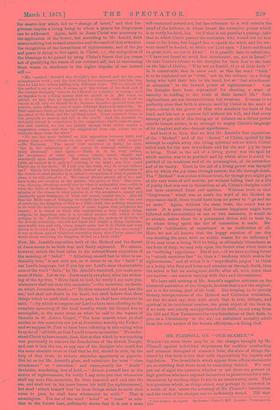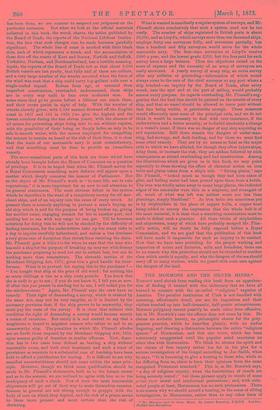MR. PLIMSOLL ON "OUR SEAMEN."*
WHATEVER error there may be in the charges brought by Mr. Plimsoll against individual shipowners for reckless overloading and criminal disregard of seamen's lives, the state of things dis- closed by this book is one that calls imperatively for iuquiry and legislation. The broad facts which appear from official documents are so startling that there must be something behind. We may put out of sight the question whether or not there are persons in high position who have exposed themselves to prosecution for a mis- demeanour by sending ships to sea in an unseaworthy state. That is a question which, as things stand, may perhaps be answered in a court of law, where the accuracy of Mr. Plimsoll's information and the truth of his charges can be sufficiently tested. Till that * Our Seamen: an iippeat. By Samuel Plimsoll, M.P. London: Vistas mud Co. 1873. 'has been done, we are content to suspend our judgment on the particular instances. But when we look at the official materials collected in this book, the wreck charts, the tables published by the Board of Trade, the reports of the National Lifeboat Institu- tion, the fact that such charges can be made becomes painfully -significant. The whole line of coast is marked with little black dots, each of which represents a wreck, and the accumulation of these dots off the coasts of Kent and Sussex, Norfolk and Suffolk, Yorkshire, Durham, and Northumberland, has a terrible meaning. Again, the reports of the Board of Trade tell us that about 2,000 British vessels are lost yearly, that fully half of these are colliers, and a very large number of the wrecks occurred when the force of the wind was such that a ship could carry top-gallant sails over a
single-reefed topsail. Rotten from age, or unsound from imperfect construction, overloaded, undermanned, these ships are in every way unfit to face even moderate seas. In some cases they go to pieces before a lifeboat can reach them, and their crews perish in sight of help. With the number of wrecks already given, with 1,333 seamen drowned off the English -coast in 1867 and 516 in 1864 (we give the highest and the lowest numbers during the last eleven years), with the absence of all means for preventing ships being sent to sea without repairs, with the possibility of their being so deeply laden as only to be -safe in smooth water, with the means employed for compelling the seamen to remain on board at the risk of their lives, it is clear that the state of our mercantile navy is most unsatisfactory, and that something must be done to provide an immediate remedy.
The more sensational parts of this book are those which have already been brought before the House of Commons on a question of privilege. It is to be hoped that when Mr. Plimsoll moves for a Royal Commission something more definite will appear upon a matter which deeply concerns the honour of Parliament. But as the object of Mr. Plimsoll's work is "to save life, not to ruin reputations," it is more important for us now to call attention to its general statements. The most obvious defect in the system which he describes is the want of a compulsory survey for all mer- chant ships, and of an inquiry into the cause of every wreck. At present there is scarcely anything to prevent a man's buying an -old ship which is sold for the purpose of being broken up, giving her another name, engaging seamen for her in another port, and sending her to sea with any cargo he can get. Till he becomes notorious for doing this he will not be checked by the difficulty of finding insurance, for the underwriters take up too many risks in a day to inquire carefully beforehand, and unless a loss discloses a very gross case of deception they shrink from resisting the claim. Mr. Plimsoll goes a little too far when he says that the man who bas sold a ship for the purpose of breaking up may see with dismay the purchaser preparing to send her out to certain loss, but can do nothing more than remonstrate. The eleventh section of the Merchant Shipping Act, 1871, gives him a good handle for inter- ference. What is to prevent his saying this to the purchaser ?— You bought that ship at the price of old wood ; for nothing like so many shillings a ton as a ship costs pounds. You know that he is unfit to go to sea ; if you do not know it, I tell you so now. If after this you persist in sending her to sea, I will indict you for the misdemeanour." Again, Mr. Plimsoll says the crew have no remedy. Their right of demanding a survey, which is created by the same Act, may not be very tangible, as it is limited by the necessary provision that, if the ship proves to be seaworthy, they must pay the costs of the survey. It is clear that without this 'condition the right of demanding a survey would become merely a means of extortion. But surely it is not correct to say that a magistrate is bound to imprison seamen who refuse to sail in an unseaworthy ship. The penaltiea to which Mr. Plimsoll alludes are no doubt those imposed by the Merchant Shipping Act, 1854, upon seamen guilty of desertion or similar offences. Now, deser- tion has in two cases been defined as leaving a ship without reasonable cause, and both cruel treatment and such a want of .provisions as amounts to a substantial case of hardship have been held to afford a justification for leaving. It is difficult to see why manifest unseaworthiness should not come within the same prin- ciple. However, though we think some qualification should be made to Mr. Plimsoll's statements, both as to the former owner and as to the seamen, we are inclined to agree with him as to the inadequacy of such a check. Few of even the more honourable shipowners will go out of their way to make themselves enemies. 'Seamen in general are not strong enough to grapple with the body of men on which they depend, and the risk of a prison seems to them more present and more certain than the risk of drowning.
What is wanted is manifestly a regular system of surveys, and Mr. Plimsoll shows conclusively that such a system need not be too costly. The number of ships registered in British ports is about 26,000, and as Lloyd's, which surveys more than ten thousand ships, employs forty-one surveyors fully, and seventeen partially, less than a hundred and fifty surveyors would serve for the whole mercantile navy. The first-class surveyors at Lloyd's receive /800 a year, and the lowest grade .£200, but the fees paid for each survey leave a large balance. Thus the objections raised on the score of expense and the necessity of an army of surveyors are easily answered. A yearly survey of every ship, an extra survey after any collision or grounding—information of which would always come to the ears of the chief surveyor at any port where a ship touched—an inquiry by the Board of Trade, after every wreck, near the spot and at the port of sailing, would probably answer every purpose. As regards overloading, Mr. Plimsoll's sug- gestion that the load-line should be painted on the outside of every ship, and that no vessel should be allowed to leave port without that line being visible, is practicable enough. These measures would effectually meet some of the principal evils, and we do not think it would be necessary to deal with over-insurance, if the underwriters had a better security, or to forbid absolutely a change in a vessel's name, if there was no danger of any ship acquiring an evil reputation. Still there remain the dangers of under-man- ning, bad stowage, and deck-loading, and for these we must find some other remedy. They are by no means so fatal as the major evils to which we have alluded, for though they often injure ships, delay them, or increase the risk, they are seldom followed by such consequences as attend overloading and bad construction. Among the illustrations which are given us in this book, we may point especially to those showing the effect of chemical action on iron bolts and plates taken from a ship's side. "Strong plates," says Mr. Plimsoll, "looked much as though they had been cakes of glue, and boiling water had been poured upon them from a kettle. The iron was wholly eaten away in many large places, the indented edges of the remainder were thin as a sixpence, and strangest of all, much of what was left was neither more nor less than plumbago, simply blacklead ! " As iron bolts are sometimes put in by shipbuilders in the place of copper bolts, a copper head being added to convey the impression that the whole bolt is of the same material, it is clear that a searching examination must be made to defeat such a practice. All these tricks of shipbuilders and shipowners, many of which have probably escaped Mr. Plim- soll's notice, will no doubt be fully exposed before a Royal Commission, and we are glad that the publication of this book will have made it impossible for such an inquiry to be resisted. Now that we have laws providing for the proper working and inspection of mines and factories, mills and foundries, there can be no reason why this protection should not be extended to another class which needs it equally, and why the dangers of the sea should carry off so many victims, while we guard with such care against the dangers of the land.



































 Previous page
Previous page